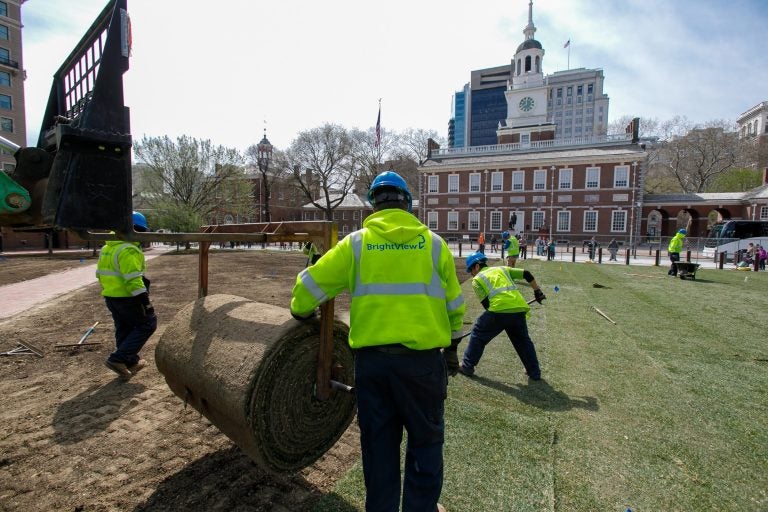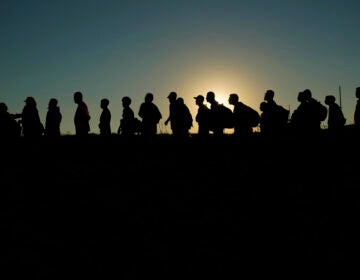Pa. landscaping companies vie for some of added summer work visas
Federal officials are releasing 30,000 more non-agricultural seasonal visas, called H-2B visas, amid low unemployment and an immigration crackdown.

BrightView landscapers work on Independence Mall. Brightview has been the largest employer of H2B guest workers in the country for the last several years. (Courtesy of BrightView)
Since March, workers with BrightView Landscaping, headquartered in Blue Bell, Pennsylvania, have been sprucing up Independence National Historical Park, laying new sod and replacing the irrigation system.
While none of the workers tending the lawn outside the Liberty Bell are working through temporary guest worker visas this year, the company is the single largest user of seasonal, non-agricultural visas, called H-2B, in the country. It sponsored 3,390 guest workers last fiscal year, according to the U.S. Department of Labor.
This week, federal officials expanded that pool of workers by nearly 50%, adding 30,000 visas to the yearly cap of 66,000. Those work permits allow companies to hire employees from outside the country to mow lawns, process seafood, trim trees, and man the rides at carnivals that traverse the country during summer months. These new visas are only available to companies that say they will suffer “irreparable harm” if they don’t receive them, and only to guest workers who have been employed by those companies in three preceding years.
Dire need or ‘raw deal’?
The surge in H-2B visas comes at a time federal immigration policy is focused on restricting immigration and reducing competition for U.S. workers from abroad. A month ago, President Donald Trump tweeted “Our Country is FULL!” while demanding the Mexican government do more to stop unlawful border crossings.
About two weeks ago, Trump ordered the creation of new restrictions on immigrants applying for asylum. In 2017, he signed an executive order entitled “Buy American, Hire American,” aimed at protecting the jobs and wages of U.S. workers.
However, each year of his presidency the number of H-2B visas has increased. These seasonal visas are technically considered “non-immigrant” visas, because they are valid for a finite time period. Trump’s own businesses have a history of requesting workers through H-2B and of employing immigrants who crossed the border illegally.
As debate rages, employers are scrambling for the additional seasonal workers. Pennsylvania is the fifth highest user of H-2B visas in the country; Texas is No. 1.
Annually, nearly half of those visas go to landscaping and groundskeeping companies, from BrightView and other big players to small, family-owned companies such as Three Seasons Landscaping, based in Upper Darby, Pennsylvania.
Three Seasons received six H-2B guest workers this year out of a hoped-for 42, according to director of operations Carl Hemphill.
“If we didn’t have these workers, we’d collapse,” said Hemphill, who also runs a labor recruitment business called MJC Solutions, LLC. He said the additional visas will help, but the landscaping business had already suffered losses for April.
Hemphill is adamant that guest worker visas should not be a part of the ongoing political conflict about immigration at all, since temporary visas such as H-2B do not lead to permanent residency in the United States.
“Our program keeps getting thrown into the illegal immigration debate, and it’s not right,” he said. “[H-2B workers] come at a certain time, and they leave at a certain time.”
Wages for laborers working under H2-B visas are set by the U.S. government at rates well above the federal minimum wage.
José Luis Cruz, 39, has been coming from Veracruz, Mexico, to work seasonally for Three Seasons Landscaping on and off since 2005. In Veracruz, he was making around $314 every two weeks. As a guest worker for the H-2B program, he now earns around $15.75 an hour, enough to send his three children to school and onto higher education.
“I have felt very at ease working here … I had hoped to further my family, create a home, build a house, and here I have succeeded,” he said.
The program has a number of critics, including unions and groups calling for lower immigration rates.
When this year’s H-2B expansion was announced, the Center for Immigration Studies research associate Preston Huennekens called it “a raw deal for Americans,” because the program “prevents the neediest Americans (ex-convicts, recovering addicts, the homeless, high school dropouts, etc.) from securing meaningful employment that could transform their lives.”
Critics such as Art Read, general counsel with Justice at Work, a Pennsylvania law firm specializing in representing low-wage workers, says that can happen when the jobs are poorly advertised to people living the United States.
“Instead of taking people from 2,000 miles away to a job, figure out how to get people nearby to a job,” he said. Read also said some employers take advantage of H-2B workers, who are tied to one job and less mobile than American workers.
The currently very tight U.S. labor market means demand for — and debate over — seasonal workers is not likely to dissipate. BrightView, which has more than 20,000 employees, plans to request more H-2B visas under the expanded cap.
“Last year, we rebranded our 8,000 fleet of vehicles with ‘Now Hiring’ permanently embedded on our trucks,” said Todd Chambers, BrightView’s chief marketing officer. “We can always use more people.”
WHYY is your source for fact-based, in-depth journalism and information. As a nonprofit organization, we rely on financial support from readers like you. Please give today.




